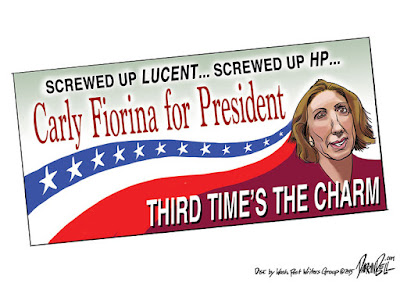--David French, National Review
1. “Joy”
Joe Morgenstern is the Wall Street Journal movie critic. The paper is pro-capitalist, so when it comes to the movie “Joy” -- based upon the entrepreneurial success of Joy Mangano, the ex-housewife and airline clerk who invented the “miracle mop” -- how does Morgenstern handle the clash between the values of his employer (conservative) and those of his Hollywood world (liberal)?
It’s not a close call. Morgenstern, along with most of his movie critic pals tanks “Joy” as a mixed bag that can’t survive superstar Jennifer Lawrence’s outstanding individual performance.
Morgenstern calls “Joy” a “seriocomic fable of entrepreneurship.” It’s not a fable, as were Horatio Alger’s 19th Century stories that inspired generations of future, up-from-dirt, middle class youth. No, “Joy” is a true story.
And “Joy” is no more or less a comedy than “American Hustle” or “Silver Linings Playbook,” two other David O. Russell-directed Jennifer Lawrence vehicles with over-the-top acting that critics then loved. But with “Joy,” Morgenstern hacks at Robert “De Niro’s insistently self-commenting performance.”
Also Morgenstern mocks “Joy” for “selling a succession of story points about persistence, independence and Joy’s creativity.” What’s wrong with “persistence, independence” and “creativity”?
Here’s why movie critics must drown “Joy” the same way they go after movies about war heroes or Christians saving souls. Entrepreneurs (soldiers, Christians) creating a better world through capitalism (war, faith) strike at the heart of progressive (anti-war, secular) collectivism. And advancing progressivism is Hollywood’s higher calling.
2. Crime
We all want less crime. Where liberals and conservatives clash is on the role strong police work plays in reducing crime.
Heather MacDonald is at the conservative Manhattan Institute. MacDonald helped create the term “Ferguson effect,” which describes the police pull-back from aggressive enforcement that followed the Summer 2014 clashes between (mostly black) protesters and local police triggered by a white policeman’s killing of an unarmed Ferguson Missouri black. The Ferguson riots generated national attention, with demonstrators gaining widespread progressive support, including from President Obama and his Justice Department, even though in the end, Justice concluded the white Ferguson policeman committed no crime.
MacDonald has the statistics to back up her assertion that the “Ferguson effect” generates higher crime rates. She writes that researchers from the liberal Brennan Center for Justice:
gathered homicide data from 25 of the nation’s 30 largest cities for the period Jan. 1, 2015, to Oct. 1, 2015. The researchers then tried to estimate what 2015’s full-year homicide numbers for those 25 cities would be, based on the extent to which homicides were up from January to October [in 2015] compared with the similar period in 2014. The resulting projected increase for homicides in 2015 in those 25 cities is 11%. An 11% one-year increase in any crime category is massive.
Baltimore’s per capita homicide rate, for example, is now the highest in its history, according to the Baltimore Sun: 54 homicides per 100,000 residents, beating its 1993 rate of 48.8 per 100,000 residents. . . Homicides in St. Louis were up 60% by the end of August. In Los Angeles, the police department reports that violent crime has increased 20% as of Dec. 5; there were 16% more shooting victims in the city, while arrests were down 9.5%. Shooting incidents in Chicago are up 17% through Dec. 13.As to the “white police kill unarmed blacks” narrative that triggered the Ferguson riots, according to a Washington Post survey, American police fatally shot 965 people in 2015, of which 564 were armed with a gun, 281 with another weapon, and 90 (less than 4 percent) were unarmed. In 75% of shootings, “police were under attack or defending someone who was.”
MacDonald believes progressives are determined to deny that depolicing is affecting public safety, committed as they are to the “root causes” theory of crime. She notes:
The Brennan Center study [hypothesizes] that lower incomes, higher poverty rates, falling populations and high unemployment are driving the rising murder rates in Baltimore, Detroit, Milwaukee, New Orleans and St. Louis. But those aspects of urban life haven’t dramatically worsened over the past year and a half. What has changed is the climate for law enforcement.Comment: Across a broad spectrum of topics -- capitalism, religion, war, crime -- America is divided into two camps, with each camp placing its preferred narrative above facts.
Which camp one identifies with seems to come back to Isaiah Berlin’s 1958 “two concepts of liberty,” a division that has preoccupied this blog ever since its 2006 year of origin. Do you truly believe in “negative liberty,” which allows each person to pursue happiness as free as possible from outside interference (beyond basic protection), or do you favor “positive liberty,” which allows the collective (and its leaders) to guide us toward “the better angels of our nature?”
Does it “take a village” to raise a child, or not?
























